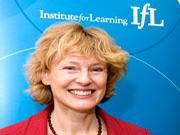FE teachers and trainers learning aloud

How do we know what we think? Most of us recognise that reflecting, talking and collaborating with others enables us to explore, test and confirm what we think. Over the last few weeks, more than 100 teachers and trainers in further education – part of a random sample selected so far – have been thinking hard and learning aloud, with the Institute for Learning’s professional development team, about the kinds of continuing professional development (CPD) that really work for them. Vivid examples and strong themes about CPD are emerging from the first focus group discussions, held around the country in a range of locations, from Newcastle to Taunton.
Teachers and trainers in further education and skills have a double thirst for CPD, as they are dual professionals, who need to be up-to-date in their subject area and in their teaching and training methods.
Teachers and trainers in our sector are responsive, and they routinely develop new courses to meet the needs of different groups of learners, employers or new requirements of qualifications – often in short order, over a matter of days or weeks. Dame Ruth Silver aptly describes FE as “the adaptive layer”, but the relatively fast speed of developments must not compromise high quality provision in FE.
How does the magic of FE work?
IfL’s extensive discussions with teachers and trainers show that it is not alchemy. Expert teachers and trainers searching and finding rapid, creative and dynamic CPD is the key to making responsive, high-quality FE opportunities possible for young people, adults, communities and employers alike. This CPD is mostly determined and driven by teachers and trainers themselves, drawing highly effectively on others, on rich sources, and on new technologies to meet their CPD needs. Research shows that teachers driving their own CPD is most likely to have a positive impact, rather than the antiquated and much-berated ‘sheep-dip’ model, which is based on the notion of pouring knowledge into half-empty vessels, sadly a ‘method’ still used in some corners of the sector.
One trainer described his post-Google quest for CPD. He set up a spider search facility to crawl the entire web for references to his specialist training area, 24 hours a day, seven days a week, so he can stay abreast of international developments in his field and make sure that the content of his training is leading edge.
A teacher trainer described using Twitter to follow the tweets of movers, shakers and thinkers in the field of education to keep up with latest developments in her subject. “I thought this was development for me,” she said, “but in fact it made more of a difference to my trainees in the end.”
Teaching methods are continually being reviewed and recent innovations include, for example, the increasing use of the iPad for group work in sessions; creating YouTube films for presentations; using coloured cards for students to indicate their levels of understanding, so the teacher gets instant and nuanced feedback from learners to see where more reinforcement of learning is needed; and other methods of assessment for learning based on robust research evidence of teaching that works and is suited to the context of FE and skills.
Each year, IfL monitors the amount and kinds of CPD undertaken by teachers and trainers and carries out a random in-depth sample to identify effective practice in CPD. IfL prepares an annual ‘state of the nation’ report on teachers’ and trainers’ CPD and shares this with teachers and trainers, IfL members, and with the sector, to help inform plans and priorities for CPD.
As part of our sampling for 2011/12, we have increased the number of discussions and opportunities for collaborative reflection across the country, and this has generated great energy, critical review and creativity for the very best CPD. This is an important role of the professional body for teachers and trainers in our sector.
IfL’s next report on CPD will be published in December 2011, and will be available online at www.ifl.ac.uk. You can download previous CPD annual reports from IfL’s website:
• 2008-09 IfL review of CPD – Making a difference for teachers, trainers and learners
• 2009-10 IfL review of CPD – Excellence in professional development: looking back, looking forward
Toni Fazaeli is the chief executive of the Institute for Learning (IfL), the professional body for teachers, trainers, tutors and student teachers across the further education and skills sector
Read other FE News articles by Toni Fazaeli:??
To every thing there is a season
FE and school teachers could consign skills shortcomings and shortages to history











Responses